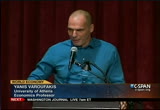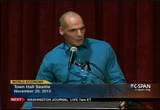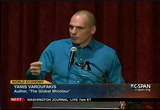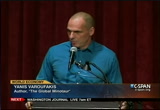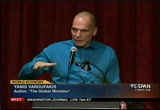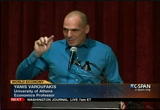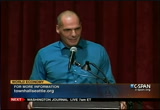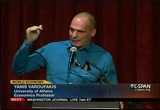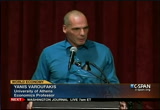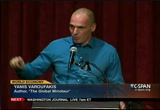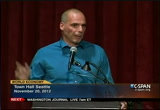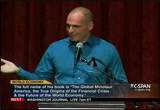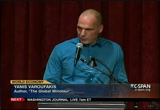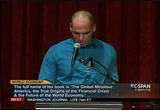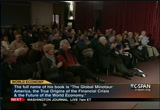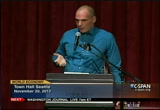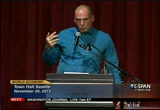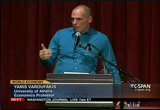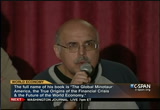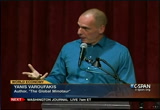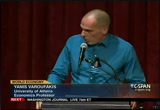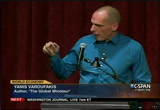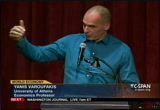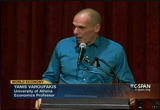tv Capitol Hill Hearings CSPAN December 27, 2012 6:00am-7:00am EST
6:00 am
you take value from the future and bring it into the present in order to make a lot more value so as to deliver the value to the future from which you took apart. the problem with this process is that once you started and it works and you make a lot of money out of it and history starts being measured in terms of years as opposed to decades or centuries, because that's what the capitalists and did through technology and innovation, the moment you start doing that, like having a machine that prints money, so you want to use more faster and more intensely, producing more money. if you overreach and take too much value from the future to bring it into the present, you
6:01 am
too. the sectors in which this dynamic annapolis process is manchin to push the boundaries of technology and create wealth -- in amsterdam and holland the with-it is always local lines. there will always be surplus riches. regis and surplus regions. southern england was in debt. now is the obvious. similarly, you have new york state in surplus, washington state inertification plus. it started in manchester, in amsterdam. it is always localized. there will always be defecit regions and surplus regions. so, manchester northern england was in surplus back then. southern england was in debt.
6:02 am
now it is the opposite. similarly, you have new york state in surplus, washington state in surplus. illinois, the dakotas in debt. missouri is your equivalent of in greece, a permanent bailout. the thing is, whereas markets are amazing institutions for allocating existing goods and services among consumers, they are chronically bad at creating a balance between deficit and surplus regions. a geographic problem, and intertemporal. remember -- if that comes first, suddenly the money lender who later becomes a banker who later becomes wall street plays a hugely significant role in this process. the banker is the conduit of that recycling mechanism. when they get an increase in proportion as the result of their mediation of that process. given that, a failure of the
6:03 am
banker is not the same thing as the failure of a clothes maker. suddenly, there are two things that must happen. one, society will demand that banks are not allowed to go to the wall. then bankers are affectively given carte blanche, free money for themselves. and the whole mechanism breaks down like in 2008. it is often said in the eurozone, we made a huge error in europe of binding disparate economies by means of common currency. this is not the first time these things that happened. it happened in the united states of america. you have disparate economies in the united states of america that are bound together monetarily. missouri and washington state
6:04 am
are as different as germany and greece. what is it that keeps the united states together? you had a great depression here in the 1930's. things were awful. and yet, i do not believe there were any political movements to get rid of the deficit states from the united states, like there are in europe and portugal and spain and everywhere else that happens to be in deficit. the reason is, the federal- state, especially after 1929 plays the role of the regulator of surplus and deficit recycling around the land. let me give you a simple example. we are in seattle. boeing is sponsoring the lectures. when boeing goes to washington to give a contract for the next generation jet or whatever, they may get it. they do get it.
6:05 am
but there are some things attached. like for instance, we want a factory that builds the wings are the engines in tennessee or missouri or arizona. in the deficit regions. this is not philanthropy. this is an act of recycling surplus so the surpluses of the surplus state can continue to be created, produced. you may recall that in the 1920s, internationally, we had a gold standard. fixed exchange rates. it is like having a single
6:06 am
economy. that gold standard creates a a degree of growth, together with the emergence of state corporations like edison that allows the bankers to run riot, to bring value to the peasant and to recycle. and that is what led to the collapse of 1939, which was that generation's version of 2008. when that collapse happened, what you had was unsustainable debts, irresponsible banking. you had the collapse of the currency. it is what we have not now in greece, exactly the same. the generation that came to power in 1932 were exceptionally fearful of what would happen to the united
6:07 am
states of america after 1944. because they very much feared that after the stimulus went through, after the stimulus of the second world war was over with the emergence of peace, the great depression would come back. they have learned their lessons from the gold standard here. and they did what? they reconstituted, they reintroduced a system of global exchange. it was the bretton woods system. the dollar was the lynchpin. all the countries around the world were locked at this specific exchange rate into the dollar. but it would not repeat the error of the 1920's adjust binding together the economies of the world without having a mechanism to recycle surplus is around the world, but because it was that lack of a mechanism
6:08 am
that brought about the disaster of the 1930's. those in power in washington in 1944 onwards were aware of the need for the surplus mechanism. interestingly, in new hampshire in 1944, there was a big clash between people in the united states, and the british influence -- someone you may have heard of, john maynard keynes, the famous economist. both agreed that the global system of fixed exchange rates had to come with what was missing in the 1920's. and what was that? it was the global surplus recycling mechanism. but they disagreed on what one should look like. keynes represented the declining empire. the weakened, previously the dominant country recommended a
6:09 am
multilateral policy. a world bank. full representation. different countries on its. he referred to it as and international clearing union, what i referred to as a global surplus for cycling mechanism. and we should all agree. but the united states said, no, mate. dollar surpluses, you cannot have any. none of you have any. you are all covered in ashes. the only accredited nation on the surface of the planet is the united states of america. i agree we have surpluses. we will recycle precisely the way that we choose and we are not going to start this recycling mechanism into a kind of united nations.
6:10 am
it is indeed the case that from 1949 until 1960 onwards, the united states of america recycle 70% of its surpluses to germany and japan. an astonishing number. 70% of the profits in the country were recycled into europe and japan. the marshall plan is a very small part of it. i will not bore you with details. but it was not an act of philanthropy. when they go to washington, it is not a philanthropic act on the pentagon's part to instruct boeing to build. it is pragmatic. the united states federal government -- unless europe is dollarized, unless they do not have dollars to spend purchasing the net exports of those who have surpluses, then they will stop having surplus.
6:11 am
this is the surplus recycling mechanism. thus, we have the 20 years of the golden age. the 1950's and the 1960's. a period of immense stability very low inflation. universal growth. we had other problems. the lease from the macroeconomic point of view, it was a golden age. why did it end? because the global surplus of recycling mechanism could no longer be sustained. why? because the united states stopped having a surplus by the end of the 1960's. how can you recycle surplus if you cannot have it. enter a young turk in 1971. well, paul volcker -- that name may ring a bell. in 1971, paul volcker was an
6:12 am
unknown working for another american. henry kissinger, who you may have heard of. before he became secretary of state. he was still national security advisor. volcker's paper, which are when i read a few years ago, i thought it was the most remarkable document ever to emerge from washington in the last 50 years, 60 years. asked a simple question. now that america is losing its surplus, looking at the emerging economies of the world -- primarily germany and japan at the time -- how will we retain our hegemony? he said we could not recycle our own surpluses. we must recycle other people's surpluses. and this is what happened
6:13 am
between the mid-1970's and 2008. the u.s. utilizing its trade deficit with the rest of the world has been operating like a huge vacuum cleaner. sucking into the united states the net exports of europe, japan, and lately china. thus providing exporters -- germany, japan, or china -- with the requisite demand necessary. so, the ever expanding trade deficit was not an accident. it was a very clever way of replacing one that surplus recycling system with another. the first one, it was one where america had a surplus and america decided instead of doing what germany is doing at the moment -- which is cutting its nose to spite its face, and thereby entering into recession by cutting, cutting, cutting -- volcker as the head of the fed had a different idea.
6:14 am
we are going to expand our dominance and our wealth by expanding our deficit and using our deficits to provide the rest of the world with the demand which is necessary to grow their economies, even at the expense of ours. and who is going to pay for the deficit? if i have an ever-expanding deficit, the bank tells me it is game over. but if you are the united states of america and you have the reserve currency of the
6:15 am
world, and certain other factors that i will touch upon later, what you can do is you can expand your deficit as long as you create the circumstances so that german entrepreneurs, later chinese, take their profit, which they earned and they send it to wall street. thus closing the cycle, the recycling loop. so, effectively what we have between 1940's and 1971, 1973, you had global surpluses being recycled from united states to the rest of the world. the capitalist world. the western world. ok? so, the united states was an exporter to europe and japan. it was making profits. it was then recycling to europe and japan. so they would keep on buying.
6:16 am
once the surplus shifted to japan, germany, and china, the idea that volcker had was a we will swap this. we will just turn it on its head. we will expand our deficit so they can expand their profits, and thus it is self-sustaining and will finance our deficits. and this is precisely how it worked. and the trouble was -- and if you want to understand exactly how the capital gains profits were attracted to the united states -- there are some key elements. there were some key elements. one was the proliferation of blue-collar workers in united states. that kept prices low. even with the oil crisis, prices in the united states rose more slowly than they did in japan or europe. so, if you were japanese or german, the profits, where do you invest them? where do you keep them?
6:17 am
you keep them with the low inflation rate. that is one reason. one mechanism that helps attract the capital from the rest of the world and close the loop. wall street was another. it has an amazing capacity to create a metaphysical value out of nothing. walmart was another. is promoted the ideology of cheapness, which was calculated so brilliantly. nobody needs a gallon of pickles. i don't think it fits in a fridge. why was walmart producing it? i think it was a symbolic gesture to establish the importance of low prices as an end in themselves. and in the process squeezing labor costs here and elsewhere and creating the circumstances for profit rates to rise higher
6:18 am
and faster to attract german and japanese capital into the united states of america. now, what do you think bankers do when you give them $5 billion every day net? to play with, even if it is only ten minutes a day? the get $35 billion -- this is the tsunami of capitalism. on average, every working day, monday through friday on wall street, $3 billion to $5 billion net. it was flowing into wall street banks. what do they do? i will tell you what they do. they find a way to make it grow for themselves. that is what bankers do. now, we can spend countless hours discussing how they did it. one word captures the process
6:19 am
-- financialization. i call it production of money, if you want, toxic money. it vaporizes the contained and sophisticated and intricate forms of debt. it is being utilized by banks as a means of exchange as though it has value. it uses them, changes them amongst themselves, in order to store value that was going to the bankers in the form of bonuses. how do we define something that works as a means of exchange that has value? money. that is why they want to cash their share options. what is it? how do we define something that
6:20 am
works as a means of exchange and total about you? money. the effective rate, bankers were given the license to print. it is as if they managed to discover an atm in the living room. it was not connected to any bank account. therefore, what did they do? if i had one of those, i would keep using it. i cannot know what i would do, especially if nobody noticed. ok? you know, i mean, the problem with crises like the one we have now is there are multiple explanations for its. so, you hear a lot people talking about the fact that wall street bankers captured
6:21 am
the politicians and regulators, and that is true, and thereby managed to avoid scrutiny. all the regulations set up in the 1930's were being swept away by people like mr. rubin and mr. geithner in the 1990's. awful people in the clinton administration. that is true. agreed. greed is good. hollywood movies are about greed. oliver stone tried to warn against it. instead, wall street bankers were imitating gecko, like war
6:22 am
movies that create warmongers. at the same time, you had another explanation which had to do with the way in which the finance tapped into computing power to create complex derivatives. all that is true. but what is underlying this and the crisis and the reason why the world economy fails to recover is that this surplus recycling mechanism -- this weird, wonderful, audacious surplus recycling mechanism from 1971 which paul volcker helped put together is the chairman of the fed in the late 1970 fell and 1980's, it broke down. in 2008, when lehman brothers broke down, and the others followed and had to be bailed out by you, what happened was the united states of america lost its capacity to utilize its trade deficit in order to recycle other people's profits. if you look at the data analysis, and i am doing so in the context of the second edition of this book, you'll find an astonishing empirical datum. the united states is producing 30% less demand for the world's manufacturers than it was in 2007. 30% is a big reduction. at the same time, remember recycling? the rest of the world -- whereas in 2007 they were financing the united states corporations to the tune of $500 billion a year, and now they are
6:23 am
taking out $50 billion. so, america is not producing demand for foreign manufacturers and foreign manufacturers are not sending their profits to united states. 56% reduction in assets held by non-u.s. residents in the united states since 2008. so, that loop that operated so magnificently has broken down. the reason why europe is in such a shambles and the reason why the dragon is angst-ridden in china is we have lost about $1 trillion every year up demand for production globally. we lost it because the surplus mechanism is broken. united states found a mechanism in 1944 and recreated in the 1970's. in a very strange way, in a very unbalanced way, but nevertheless did. since 2008, we have not managed to regain our poise. the mechanism broke down.
6:24 am
the emphasis about the public debate on debt is the homage austerity pays to philanthropy in order to maintain what i call the new regime we live under, which is not capitalism. capitalism died in 2008. i'm an old left-winger. when i was growing up, i was having these very nice debates with liberal right wing sectarian -- they were debating about capitalism. they said capitalism is like the jungle. they said it was all about the survival of the most efficient and significant. the left argued central planning is better, you know.
6:25 am
more just. in 1991, the soviet union died. the left died. in 2008, capitalism died. if it is true that capitalism is a social darwinist game that gives rise to the survival of the fittest, what happens in 2008 when we have the survival of the most bankrupt? that is hypocrisy. not by banks, but by bankrupt banks. and the more bankrupt you are, greater your power for the destruction of wealth to your society. so, this emphasis on debt is nothing more than a conspiracy in order to exploit prejudice and fear. because if i am right the what we have here is a breakdown of surplus recycling, which has a
6:26 am
symptom of lot of debt and a lot of savings, and the two wipe out one another, this emphasis on debt is the revenge of herbert hoover and nothing more than that. if we look at one of the twin peaks and not at the other and cut down on debt, all we manage to receive its increased debt. in greece, we've had the most brutal, a substantial fiscal squeeze and in the history of humanity. if you look at the numbers, and nowhere before as the budget been squashed so savagely. and what happened to the debt? 129% to 200% of gdp. it is what happens. when you kill the cow that produces the milk, it will not produce more milk and if you
6:27 am
keep hitting it, it will not produce more. the problem with the economy is, we need to start recycling global surpluses again in a rational way. the great advantage of having no qualms about lying through your teeth as politicians in this country and in my country have been known to do -- the story that i have been trying to tell is quite complicated. when in being interviewed by the media, you have about 20 seconds. if you say, well, we have too much debt. we will become the slaves of the chinese like these awful advertisements -- that is completely wrong. you can just go like this. it is all over and done with.
6:28 am
it is a story with a beginning, middle, and end. you can tell it in 20 seconds. my story, i have been talking and fast for such a long time, and i have still not managed to piece it together fully. what i have been telling with a colleague of mine and friend -- we were trying to think of a metaphor. and the metaphor that i thought of was the global minotaur, which is the title of the book. one of the few advantages of being greek is you have a great wealth of mythologies, of myths to tell the story. by which to tell a story about the world. so, i'm going to finish off by
6:29 am
reading one page -- i am trying to save on paper. i have it on the phone. it is the story of the global minotaur. what i am going to read is dear to my heart. one of the great joys of publishing this book is it appeals to people who do not know anything about economics and therefore are much more sensible than we economists are. one group of gadgets from the royal college of the arts want to create an animated story out of my book, and they asked me to write the script. allow me to read the script. it is how i am going to finish.
6:30 am
see if you can recognize in this little story, which i was just dipping into greek mythology, the broader economic story that i have been relating to your support. ok. once upon a time in the famous labyrinth of the king's palace, there lived a creature as fierce as it was tragic. its intense loneliness matched only by the fear it inspired far and wide. you see, the minotaur had a voracious appetite which can only be satiated with flesh. the king, who secured peace, the one who enabled trade to crisscross the seas with bountiful ships and spread prosperity around the world. alas, the beast's appetite could only be satiated by human
6:31 am
flesh. every now and then by ship loaded with young slaves was bound to greece to deliver its human tribute to be devoured by the minotaur. a gruesome ritual that was essential for preserving the peace and producing trade and prosperity. many years later a global minotaur rose up from the ashes of the first postwar phase, the one created by america from the ashes of the war. it is there -- a form of labyrinth was greeted deep in the american economy. it of the form of the united states trade deficit which consumes the world's exports. the more the deficit grew, the greater its appetite for europe and asia as capital, and what made it truly global with its function.
6:32 am
it took financial capital and surplus money, and kept the cleaning german factories busy. it gobbled up everything produced in japan and later in china. and for the american owners of these distant factories, they said their profits to wall street, a form of tribute to the global minotaur. what do bankers to when such a tsunami of capital comes their way daily? between $3 billion and $5 billion every week. they find ways to make it grow on their behalf. sawus in 1985, 1990's, you an explosion of money minting on the back of the daily capital tsunami that floated to feed the global minotaur.
6:33 am
just like its mythological predecessor, the global minotaur has kept the economy going for decades. until the pyramids of private money built on the tribute collapsed on their own weight. economy is simply not large enough to hold it so much private toxic money. money like a paper that burns down once the collapse begins. in this confederation, the global minotaur was wounded. while in rude health, the minotaur formed new forms of pleasure and new forms of deprivation. ample security for a few and spectacular insecurity for most. creating spectacular failures of common decency. whatever we think of the global minotaur's reign, he kept the world going and thinking its
6:34 am
regime was stable, moderate even. meanwhile, its gross excesses' remained out of sight. until some believe their own rhetoric -- read ben bernanke -- about moderation. but when the global minotaur was mortally wounded, it left the global economy in disarray. it has put the world in permanent crisis. the minotaur was slain by a brave warrior named theseus. its death ushered a new era of tragedy, history, philosophy. our very own global minotaur died as the victim of wall street bankers. what will its demise bring?
6:35 am
should be hope for a new era in which wealth does not require poverty? will be develop a system where no longer will abstract power waned while others get stronger? the global minotaur will be remembered as a remarkable piece to whose rain created and destroyed the illusion that the global economy was stable. thank you. [applause] right. questions? i think i am going to moderate myself. ok, you have to line up. this is the way you do it here,
6:36 am
isn't it? >> that is a brilliant vision of where we have been. can you elaborate a little bit more on where you see us going? >> very briefly, i think that we are in a state of sustained bewilderment. because, let's face it. in the 1930's, the new deal, despite some early successes failed by 1936 or 37. 1938, we have the second great depression. it was only the war that managed to do the recycling the new deal failed to accomplish, due to fdr's backtracking. now we have a world economy which conceivably, that technically finds its way forward to plug the gaps and black holes.
6:37 am
20the g-20 easily agreed to a plan that is very much like that which john maynard keynes proposed in 1944. but it is unlikely they will. it is a comedy of errors. the european leaders are competing to produce a plan that is more idiotic. they are so entrenched. they are so parochial. they are beyond squabbles. they have a horizon of 8 months to the next federal election in germany, for instance. greece therefore is the sick person europe. of the world. meanwhile, the united states of america is ungovernable. you have a system in this country that was created to create this country as an ungovernable state. you have congress, the president canceling each other out.
6:38 am
how the president -- whoever the president might be -- do anything? you have china -- finding it impossible to provide a replacement for the demand that the west has done away with. so, i do not have an answer for your question. bewilderment. >> my question is about consumer demand and the extent to which the old system depended on it. if we do not have it to the same degree, could there possibly be a new economy? i cannot know how to say all of these in the right economic terms. i will say what i am thinking and see what you make out of it. its teams like all the economy's got to a point where it had to be based on growth.
6:39 am
it could not just be sustainable. it had to grow. and that meant more consumers. so, then, that led to a lot of things ecologically that were not good for the earth's, things that people did to maximize profits. so, that is one thing. is there the possibility there might be a new economy that is not based on growth? second, if you do not have consumer demand at the same level that he used to -- and of course, i think that is why. one of the pieces that you talked about is that americans are credible consumers come away more than europeans. i went to a store today, and there is so much junk americans will buy and other economies
6:40 am
will not. what if consumer demand has changed? and the third thing is, in my own work i deal with a lot people that are getting divorced and not paying their mortgages. for the first time in seeing people say, we just won't pay our mortgage. and that would be unthinkable. previously people would do anything to save their home and their credit. now people do not care. all the time. they say, we just won't pay our mortgage, and they do. so, i think the consumer attitudes about consumption and debt are really different as a result of this crisis. i do not know of any of that means anything. >> do we have a couple of hours? it is very important to draw a distinction most economists do not draw. or have not been drawing for a very long time. this has been a calamity for the planet earth. the distinction between growth and development. is one thing to say we want development and another thing to say we what growth. growth is often at the expense
6:41 am
of development. so, do not believe in growth of co2 or poison or toxic derivatives. i think we should have a serious recession in these markets, these sectors. but i do believe in education. i believe we should invest in our education systems. smaller classes. no high-capacity schools, because they produce morons. the great and the good want their kids to have the best. you mentioned something that i disagree with. the reason why american consumers consume more than europeans is not a cause of some kind of fundamental cultural difference. what you have -- first, america was the only country that had been effectively untouched by the war. so you had more consumption for durables. i am not sure that americans --
6:42 am
naturally, americans would be the first to enjoy them. then, after that, what you have is a massive reduction in the real wage, the real median wage. i do not know if you know that. today we do not have a real median wage that is anywhere near where it was in 1972. what has been the effect between 1970's and 2008 is that living standards were being pushed into the ground, hours were being expanded to make ends meet. real hourly wages were declining. they were working longer hours. that put enormous strain on families. my friends in sociology say that this is correlated with a very fast rise in divorce rates in united states. you have the attempt to
6:43 am
substitute the loss of quality with quantity. the walmart phenomena and. that is why i mentioned the pickles. who gives a damn about one gallon of pickles? it is there. i have a psychoanalytic view of that. a person who feels exploited and works for nothing and has to work much longer hours goes into walmart, buys the jar and feels like he has been able to steal someone's labor. and that is very alienating. this kind of consumerism, which destroys the environment, which creates circumstances of the devolution of living standards -- this is the result of the global surplus recycling, which
6:44 am
is why this squeezing of the delights of the workers to keep prices low, but to keep the price is lower than germany or japan, to keep the capital coming here, to keep the german and japanese finance going. i don't believe in pointing fingers at anyone. we are all part of this system that we have created over the last few decades. which met its nemesis because of its hubris. >> i would like to ask three questions. one is to summarise, briefly, what did happen in greece? why did we slide further down in the world?
6:45 am
number two, could you please summarize an alternative approach? what could, for example, the greek prime minister have done instead of what they did it? and third, there is a hamiltonian economic system from 1789 that created a great america before america became a global power -- could that help greece? >> i will answer your questions starting at the beginning. what happened in greece? we created the eurozone. let me put it this way. in our country, because you come from greece, too, they have been monopolizing the headlines. there is something wrong with the world, if this can happen. imagine if there was a fiscal crisis in the great state of delaware that could bring the united states down.
6:46 am
i think you would agree if i were to suggest to you there was something wrong not with the state of delaware, but with the united states of america. if one state can monopolize the headlines for so long -- it is an indication there's something wrong with the world, right? it is like saying, oh, this snowflake cause the avalanche. this snowflake is to blame. even if you remove the snowflake. the avalanche would have happened. greece has always flirted with debt implosions. we have defaulted a number times over the last century. done it again last march. if it were not part of the eurozone, it would not have been in the headlines. it would be growing back again now. with all its malignancies and corruption, all the rubbish in
6:47 am
our country. it has not been enough to stop the recovery from happened. we have done this before. we did it in the 1970's, the 1960's, the 1930's. when you lock yourself into a kind of gold standard -- let me or you a little bit with a history on the eurozone and the euro crisis. this is inimately connected with the story i have been telling today. when the global minotaur was happening, america was single- handedly responsible for generating enough demand for germany, to be the exporter, to not have to worry about who was creating demand for the equipment. germany was the net exporter
6:48 am
within the eurozone and without the eurozone. and so it happened that the eurozone could keep sailing like a beautiful river boat. but with the storm of 2008, they started sinking. and the top people yelled at people that were below decks, saying, why are you allowing the water to sink in? we are going to punish you, and waterboard you fiscally. this is what is happening to greece now. is being fiscally water boarded. it is complete madness. not having learned the lessons of the 1930's, we are repeating all the problems with the gold standard. now, what could the greek government have done? two greek prime ministers.
6:49 am
one from 2004 to 2009. in greece, greece has had experience with that since 1974 after the expiration of parliamentary democracy. government, regardless of which party is in government, the accelerator to create some kind of flimsy growth, at some point it became clear that we had a cliff. our debt situation would get too much. and then we would hit the brakes. austerity. which creates increased unemployment. but nevertheless, the debt was manageable. they did this up until 2004. 2004 was accelerated because of the olympics.
6:50 am
the next government should have stopped it. but unfortunately government is government. government kept the foot firmly on the accelerator. why? because german capital was flowing to the country at cheap rates, financing ponzi schemes. it is just like the subprime market here where people were coerced to take loans that could not afford. similarly in greece. so, you had executives coming to greece, bribing politicians. the greek government -- they did not listen. then 2008. the conservative prime minister, he is not a stupid man. he was a terrible prime minister, but he is not a stupid man. you know what he did? he bailed out. he has not spoken since. he affectively called for a general election. he did not contest it. it was much worse than obama's first debate. he appeared before them and was
6:51 am
like "don't vote for me." he lost that election. he did not have to call for that election. he called for it to lose it, to stay at home. he has not spoken since. he is having a nice holiday. and then there was papandreou. i was an advisor up until 2006. so i am not to blame. who unfortunately, he did not see the crisis of the eurozone collapsing. the eurozone had no foundation. there was an earthquake. it starts unraveling with greece. and let's say between 1995 2008 god and his angels descended on an athens and ran the show. with rationality, omniscience, ethos, and morality. greece would not have been the
6:52 am
first domino to fall. but it would have been the third. grace would have fallen after ireland or possibly after portugal. it was never designed to sustain a crisis like 2008. we were doomed. finally, the united states that we know today is the result of the crisis of the 19th century and the early 20th century. 1 very preciously saw the crisis -- and still there is a commonality of debt, and effective recycling of debt, the road be no such thing as a nation that was sustainable. you had a crisis that led to a gradual, discreet, fundamental change from the pacific to the
6:53 am
atlantic. many europeans, like you would imagine or hope, but this crisis in europe would also mean continental consolidation. i do not see that happening, for reasons i will not bore you with. it would be nice to have a united states of europe. >> i have a couple of questions and comment. what do you see in terms of inflation or deflation? my guess would be deflationary. for the average personal investor, what would you advise? my take is treasury-protected securities are pretty good way to go. [laughter]
6:54 am
the last comment is -- but shouldn't crease -- shouldn't greece all its own tax collection? >> let me start with the last question before i start giving out financial advisor. [laughter] greece certainly should focus on dealing -- not so much with tax collection, but what i call tax immunity. they have a very cozy system of tax immunity. the tragedy is when you have an economy like greece's going to a tailspin and you have a massive immunization of national income, and the central bank is effectively kaput, you can really improve your tax collection methods because there is no income tax. people just do not make money
6:55 am
any more. even the rich do not make money. other than the money they have already accumulated through geneva or frankfurt. they are not making money. how can you improve your tax mechanism when there's no income tax? that is the second question. the first question -- i am not worried about inflation at all. in this country, there is this fixation with quantitative easing. bernanke's attempt to stabilize the american economy. it is a policy that i have encountered ever since i came to this country. mr. bernanke is printing money. he is not printing money. if it were, you could talk about the loss potential, which
6:56 am
is different from deflationary. but what exactly is quantitative easing? i wish he could print money and give consumers the money they need to buy things and pay down their debt. because that does not it added. it relieves negative equity problems. that is why some people refer to him as helicopter ben. before he became the chairman of the fed, he said it would be a good idea in the middle of the great recession to do that. when he buys mortgage-backed securities from jpmorgan, right? effectively what he does is he creates an audit from which jpmorgan controls to pass these mps's to another bank. jpmorgan cannot lend that money to you.
6:57 am
the only way he can make this happen with qe is if there is an amazing equilibrium among the bankers, and at the same time, they must feel that as a result of this that interest rates will fall sufficiently for house buyers to order new homes from them, so they can make use of those new loans. that is why it as a result of this coincidence of optimism, it is nowhere to be found in this equilibrium of fear that we are experiencing.
6:58 am
the money supply is not increasing. but bernanke loves to print money. my criticism of quantitative easing is what he is trying to do is to create a new bubble in mortgage-backed securities. we talk about toxic derivatives. they are not really toxic derivatives. what they are is paper priced at very low prices. he is trying to create a bubble. so, it is not a quantitative easing even. i call it price easing. i am not giving you a price on what to buy. i do not want you to blame me.
6:59 am
>> unfortunately, that is all the time we have today. we will be having a sign. thank you for coming today. [applause] [captioning performed by national captioning institute] [captions copyright national cable satellite corp. 2012] >> coming up today and since then, "washington journal" is live with your calls and comments. retiring members of the house and senate. dan burton on his 30 year career. and kent conrad on his 26 year career. in 45 minutes, a discussion of the coming years'housing market . .
136 Views
IN COLLECTIONS
CSPAN Television Archive
Television Archive  Television Archive News Search Service
Television Archive News Search Service 
Uploaded by TV Archive on

 Live Music Archive
Live Music Archive Librivox Free Audio
Librivox Free Audio Metropolitan Museum
Metropolitan Museum Cleveland Museum of Art
Cleveland Museum of Art Internet Arcade
Internet Arcade Console Living Room
Console Living Room Books to Borrow
Books to Borrow Open Library
Open Library TV News
TV News Understanding 9/11
Understanding 9/11